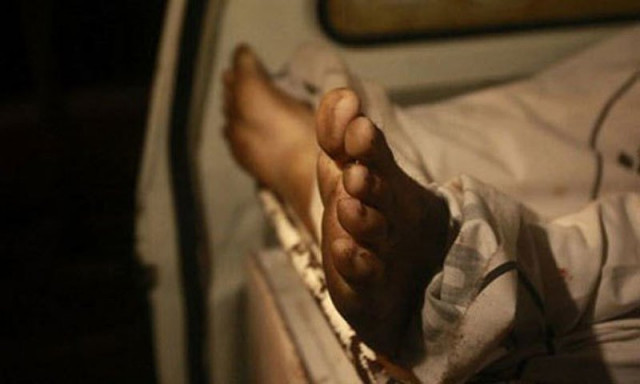Keamari’s gas leak leaves ‘unknown body’s’ family in the dark
"We still don't know what happened. No one knows," resident tells The Express Tribune

A Reuters file photo.
When it comes to taking responsibility for those who lost their lives, it appears there is no system, especially when the deceased are unidentified. Instead, their families are left to fend for themselves.
Toxic gas leak takes toll on petrol supply in Karachi
On Monday, a 45-year-old man living in Keamari died as a result of the toxic gas. His body was shifted to a hospital, where he was declared an 'unknown person' who had died of 'unknown reasons.' No efforts were made to identify him or find his family.
Instead, he became the first person whose body was brought to Dr Ruth Pfau Civil Hospital for an autopsy. The mourning relatives of the others killed by Keamari's mysterious gas leak took their loved ones away without post-mortems.
Trying to figure out what was going on, the authorities took samples from the body of the 'unknown person.' Once done with that, they sent the body to the Edhi morgue and washed their hands of it.
His name, though, was Ali Gul, son of Rasool Bux. He was a resident of Lal Dino Ujjan village in Kingri taluka, Khairpur.
A daily wage worker, he left behind four daughters and three sons in the village, who used to visit him once a month. "Gul used to live with other labourers in a rented house in Keamari. We had no idea he was no more until we were informed by his friends, who had seen his photo published in a local newspaper," disclosed his elder brother, Mir Muhammad. He said that his relatives and Gul's friends ran from pillar to post, trying to find his body in different hospitals in the metropolis. "But nobody bothered to help us."
Gas fumigant possible cause of Keamari toxic mystery, says top govt doctor
In the end, they went to the police, who told them to check at the Edhi morgue on Tuesday night. There, they ended up having to gather money to transport Gul's body back to his village, according to Hazoor Bux, a relative.
"Who is responsible if someone dies in this way?" asked Bux, pointing out that it wasn't a natural death. "There is no system in place."
Riaz Ujjan, another relative, insisted that it was the state's responsibility to at least transport the body to the home of the deceased.
As fear shrouded Keamari, Omar Bhatti, a resident of the area, said that he had only witnessed people turning to rescue workers for help, rather than the authorities. "When an emergency occurs, everyone looks to Edhi or Chhipa," he pointed out.
According to Bhatti, not a single medical camp was set up in the area. Nor were there any officials to assist the panicking citizens. "We still don't know what happened. No one knows," he said, talking to The Express Tribune.
"The families who lost their loved ones have received no assurances that justice will be provided to them. But the responsibility of the administration does not just end at releasing statements to the media."
Published in The Express Tribune, February 20th, 2020.

















COMMENTS
Comments are moderated and generally will be posted if they are on-topic and not abusive.
For more information, please see our Comments FAQ